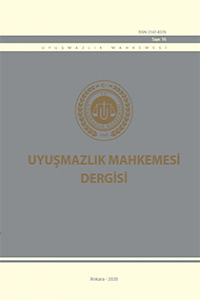(Birleşmiş Milletler İnsan Hakları Sözleşmelerinde Bireysel Başvuru Usulü: Etkinlik Sorunu)
İnsan haklarının korunması konusunda şüphesiz en önemli araçlardan birisi hak arama hürriyetidir. Hak arama hürriyeti kişilerin ulusal düzeyde etkili ve adil bir itiraz mekanızmalarını kullanabilme hakkını da içermektedir. Bu bağlamda Birleşmiş Milletler İnsan Hakları Sözleşmeleri bireysel başvuru yolunu benimsemiş ve taraf devletler tarafından ihlal edilen insan haklarının ilgili insan hakları komitesine taşınmasına imkan sağlanmıştır. Başvuru koşulları her bir sözleşmede ayrı ayrı ayrı belirtilmekle birlikte kabul edilebilirlik kriterleri açısından AİHM ve diğer uluslararası mahkemelere başvuru koşulları ile benzerlik arzetmektedir.Komitelerin kararlarının etkinliği ve iç hukuka etkisi bakımından ise hala sorunlar bulumaktadır. Zira, söz konusu komiteler bir yargı organı olmaması ve kararların uygulanmasında gönüllülük esas olması nedeniyle uygulamada istenen netice elde edilememektedir. Bununla birlikte devletlerin iç hukuktaki uygulamalarının uluslar arası başka bir organın denetimine açmış olmaları ve uluslar arası hukuk sistemi içinde yer alan diğer yaptırım şekilleri insan hakları konusunda evrensel bir farkındalık oluşturmasına katkı sağladığı düşünülmektedir
Anahtar Kelimeler:
İnsan hakları, bireysel başvuru, BM insan hakları, BM insan hakları komiteleri, Kabul edilebilirlik
INDIVIDUAL COMPLAINT MECHANISM UNDER THE U.N. HUMAN RIGHTS CONVENTIONS: HOW EFFECTIVE IS THE MECHANISM? (Birleşmiş Milletler İnsan Hakları Sözleşmelerinde Bireysel Başvuru Usulü: Etkinlik Sorunu)
The recent increase in the creation of individual complaint mechanismsfor individuals or groups who claimes to have been violated their rightsclearly proves that there has been put a great effort to protect human rightsthrough such mechanisms under relevant covenants. By means of thisdirect communication procedures individuals are provided with a greaterability to access to the human rights committees under the covenant.Particularly, U.N. human rights treaties provide direct acsess to therelevant committee and bring their action before the committee. Thegeneral provisions and admisibility rules are regarded very similar tothe European Court of Human Rights (ECOHR) and other internationalcourts.However, there have been stil problems in terms of human rightsprotection via individual complaint mechanism. The main challengeis that the enforcement of committee decisions are upon the will of theState Party as these committees are not judicial organs. While some othersanctions or ways can be found in the international affairs area, the stateparties are not seem reluctant to enforce committee decisions.
Keywords:
-,
___
- ARAMBULO, Kitty, “Drafting an Optional Protocol to the International Covenant on Economic, Social and Cultural Rights: Can an Ideal Become Reality?”, 2 U.C. Davis J. Int’l L. &Pol’y, 111 (1996).
- BAUMGARTNE, Samuel P., “Does Access to Justice Improve Countries’ Compliance with Human Rights Norms? An Empirical Study,” 44 Cornell Int’l L.J., 441 (Fall 2011).
- BIJNSDORP, Mireille G.E., “The Strength of the Optional Protocol to the United Nations Women’s Convention”, 18 Neth. Q. Hum. Rts., 329 (2000).
- DONOHO Douglas Lee, “Human Rights Enforcement in the Twenty- First Century”, 35 Ga. J. Int’l & Comp. L., 1 (Fall 2006).
- DONOHO Douglas Lee, “Democratic Legitimacy In Human Rights: The Future of International Decision-Making”, 21 Wis. Int’l L.J., 1 (Winter 2003)[Hereinafter Legitimacy].
- GOODMAN, Ryan & JINKS, Derek, “Measuring the Effects of Human Rights Treaties”, 14 E.J.I.L., Vol. 14, No.1, 171 (2003).
- HAMAMOTO, Shotaro, “An Undemocratic Guardian of Democracy - International Human Rights Complaint Procedures”, 38 Victoria U. Wellington L. Rev., 199 (2007).
- HARRINGTON, Alexandra R., “Don’t Mind The Gap: The Rise of Individual Complaint Mechanisms within International Human Rights Treaties”, 22 Duke J. Comp. & Int’l L., Winter 2012, 153 (2012).
- HATHAWAY, Oona A., “Do Human Rights Treaties Make a Difference?”, 111 Yale L.J., 1935 (2002).
- HELFER, Laurence R., “Overlegalizing Human Rights: International Relations Theory and the Commonwealth Caribbean Backlash Against Human Rights Regimes”, 102 Colum. L. Rev., 1894 (2002).
- MELISH, Tara J., “Introductory Note to the Optional Protocol to the International Covenant on Economic, Social and Cultural Rights”, 48 Int’l L. Materials, 256 (2009).
- O’FLAHERTY, Michael, “Human Rights and the UN: Practice Before the Treaty Bodies”, The Hague: M. Nijhoff Publishers, 81 (2002).
- of Racial Discrimination, art. 14, https://treaties.un.org/doc/
- Treaties/1969/03/19690312%2008-49%20AM/Ch_IV_2p.pdf. (last visited April 15, 2015) [Hereinafter CERD].
- International Convention on the Protection of the Rights of All Migrant Workers and Members of Their Families, art. 77, https://treaties.un.org/ doc/Treaties/1990/12/19901218%2008-12%20AM/Ch_IV_13p.pdf visited April 15, 2015) [hereinafter CMW]. (last
- Optional Protocol to the International Covenant on Civil and Political Rights, United Nations Treaty Collection, https://treaties.un.org/doc/ Treaties/1976/03/19760323%2007-37%20AM/Ch_IV_5p.pdf (last visited April 15, 2015) [Hereinafter Optional Protocol to ICCPR].
- Optional Protocol to International Covenant on Economic, Social, and Cultural Rights, United Nations Treaty Collection, https://treaties. un.org/doc/Publication/CTC/Ch_IV_3_a.pdf (last visited April 15, 2015) [Hereinafter ICESCR Protocol].
- Optional Protocol on the Convention on the Elimination of All Forms of Discrimination Against Women, at pmbl, https://treaties.un.org/doc/ Treaties/1999/10/19991006%2005-18%20AM/Ch_IV_8_bp.pdf (last visited April 15, 2015) [Hereinafter Optional Protocol to CEDAW].
- Optional Protocol to the Convention on the Rights of Persons with Disabilities, https://treaties.un.org/doc/Publication/CTC/Ch-15-a.pdf (last visited April 15, 2015) [Hereinafter Optional Protocol to CRPD].
- “Wilson v. Philippines, Views”, Human Rights Comm. 79th Sess., Oct. 20-Nov. 7, 2003, U.N. Doc. CCPR/C/79/D/868/1999 (Nov. 11, 2003).
- http://treaties.un.org/pages/ViewDetails.aspx?src=TREATY&mtdsg_ no=IV-4&chapter=4&lang=en (visited April 15, 2015).
- https://treaties.un.org/Pages/ViewDetails.aspx?src=TREATY&mtdsg_ no=IV-5&chapter=4&lang=en (last visited April 15, 2015).
- http:// treaties.un.org/Pages/ViewDetails.aspx?src=TREATY&mtdsg_ no=IV-3&chapter=4&lang=en (last visited April 15, 2015).
- https://treaties.un.org/Pages/ViewDetails.aspx?src=TREATY&mtdsg_ no=IV-3-a&chapter=4&lang=en (last visited April 15, 2015).
- https://treaties.un.org/Pages/ViewDetails.aspx?src=TREATY&mtdsg_ no=IV-2&chapter=4&lang=en (last visited April 15, 2015).
- https://treaties.un.org/Pages/ViewDetails.aspx?src=TREATY&mtdsg_ no=IV-8-b&chapter=4&lang=en (last visited April 15, 2015).
- Toward an International Rule of Law / 2010 Report, 24 Pac. McGeorge Global Bus. & Dev. L.J., 201- 203 and 222-223(2011). (Footnotes) 1 MELISH, 256.
- https://treaties.un.org/Pages/ViewDetails.aspx?src=TREATY& mtdsg_no=IV-3-a&chapter=4&lang=en (last visited April 15, 2015).
- Optional Protocol to ICESCR, at pmbl. https://treaties.un.org/doc/ Publication/CTC/Ch_IV_3_a.pdf (last visited April 15, 2015) [Hereinafter ICESCR Protocol]. 4 Id, art.2.
- ISSN: 2147-8376
- Başlangıç: 2012
- Yayıncı: T.C. UYUŞMAZLIK MAHKEMESİ
Sayıdaki Diğer Makaleler
YARGI ORGANLARINCA HÜKMEDİLEN VEKÂLET ÜCRETİNİN AİDİYETİ SORUNU
(İngiliz Teamül Hukuku Sisteminde Mahkemelerin Yorum ve Kanun Yapması)
BİREYSEL BAŞVURUDA BULUNMA USULÜ
YARGITAY KARARLARI IŞIĞI ALTINDA HIRSIZLIK SUÇLARDA ETKİN PİŞMANLIK
(Birleşmiş Milletler İnsan Hakları Sözleşmelerinde Bireysel Başvuru Usulü: Etkinlik Sorunu)
Prof. Dr. Ali TÜMER, Doç. Dr. Aysun ODABAŞI, Doç. Dr. Dilşad ÖZDEMİR, Yrd. Doç. Dr. Erdem MUTLU, Dr. Ayşe KAYNAK
Terörizm ile Organize Suç Arasindaki İlişki; Büyüyen Bir Tehdit midir?
